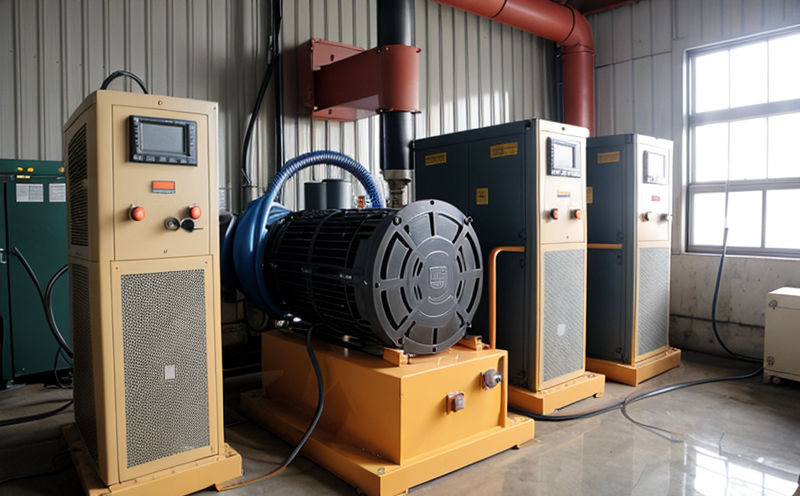ASME PTC 46 Overall Power Plant Performance Testing
The ASME (American Society of Mechanical Engineers) Pressure Technology Committee's Purchase and Test Criteria (PTC) for Power Generation Equipment, specifically PTC 46, is a comprehensive set of guidelines designed to ensure the performance and reliability of power generation equipment. This service focuses on conducting overall power plant performance testing in accordance with ASME PTC 46. The goal is to evaluate the efficiency, safety, and operational integrity of various components within a power plant, including turbines, boilers, condensers, and steam generators.
The ASME PTC 46 standard provides detailed criteria for testing and evaluating the performance of these systems under real-world operating conditions. This includes not only the individual components but also how they interact as an integrated system. The test procedures outlined in this standard are critical for ensuring that power plants meet their design specifications and operate efficiently over their intended lifetimes.
The testing process involves several key steps, each aimed at assessing different aspects of the plant's performance:
- Component Testing: Individual components such as turbines, boilers, and condensers are tested to ensure they meet design specifications. This includes mechanical integrity checks, thermal efficiency assessments, and material property evaluations.
- System Integration Testing: The interconnected nature of power plant systems is evaluated to ensure all subsystems work harmoniously together under load conditions. This helps identify any potential bottlenecks or inefficiencies in the overall system performance.
- Operational Performance Evaluation: Real-world operational scenarios are simulated to assess the plant's response to various loads and environmental conditions. This includes evaluating the plant’s ability to maintain stable output during peak demand periods, as well as its capacity to respond to emergency situations without compromising safety or efficiency.
- Compliance Verification: Ensuring that all test results comply with ASME PTC 46 standards is crucial for validating the reliability and performance of the plant. This includes comparing actual test data against theoretical predictions and ensuring that any deviations are within acceptable limits.
The testing procedures outlined in ASME PTC 46 are designed to be rigorous yet flexible, allowing for adjustments based on specific plant configurations and operational requirements. This ensures that power plants can achieve optimal performance while also adhering to strict regulatory standards.
By conducting thorough overall power plant performance tests, we help ensure the safety and reliability of power generation facilities. Our expertise in this area allows us to provide comprehensive testing services tailored to meet the unique needs of each client's power plant. Whether it’s a new installation or an existing facility undergoing upgrades, our team can offer valuable insights into improving efficiency and extending the lifespan of critical equipment.
Our commitment to quality is reflected not only in the accuracy of our test results but also in our dedication to providing clear, actionable recommendations based on those findings. We work closely with clients throughout every stage of the testing process, ensuring they have all the information necessary to make informed decisions about their power generation infrastructure.
Benefits
- Enhanced Reliability: Ensuring that all components of a power plant function reliably under real-world conditions enhances overall system reliability.
- Improved Efficiency: By identifying and addressing inefficiencies early on, we help clients optimize their power generation processes.
- Cost Savings: Preventing failures through proactive testing leads to reduced downtime and maintenance costs.
- Regulatory Compliance: Ensuring adherence to ASME PTC 46 helps avoid penalties associated with non-compliance and demonstrates a commitment to safety and quality.
- Extended Equipment Lifespan: Regular performance testing allows for early detection of potential issues, preventing premature wear and tear on critical components.
- Better Decision Making: Detailed test results provide valuable data that can inform strategic decisions regarding equipment upgrades or replacements.
Industry Applications
- New Power Plant Commissioning: Ensuring new installations meet all design and operational expectations.
- Maintenance and Repair Verification: Verifying the effectiveness of maintenance activities and repairs through rigorous testing.
- Emergency Response Validation: Simulating emergency scenarios to ensure that power plants can respond effectively without compromising safety or efficiency.
- Performance Optimization: Identifying areas for improvement in existing facilities to enhance overall performance.
- Regulatory Audits: Providing comprehensive documentation and data to support compliance with regulatory requirements.
- Research and Development: Assisting in the development of new technologies by validating their performance against established standards.
Eurolab Advantages
At Eurolab, we bring a wealth of experience and expertise to every ASME PTC 46 compliance project. Our team comprises highly skilled engineers who stay up-to-date with the latest advancements in power plant testing technology. This ensures that our clients receive not only accurate test results but also insightful recommendations for improving their facilities.
We pride ourselves on providing exceptional customer service, from initial consultation to final report delivery. Our dedicated staff works closely with each client to understand their specific needs and goals, tailoring our services accordingly. We offer flexible scheduling options to accommodate tight deadlines without compromising quality.
In addition to our technical expertise, Eurolab is committed to sustainability and continuous improvement. We strive to minimize environmental impact during testing while maintaining the highest standards of accuracy and reliability. Our commitment extends beyond just meeting current regulations; we aim to set new benchmarks for excellence in power plant performance testing.





